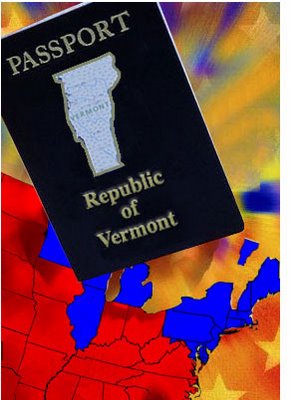Tuesday, October 3
Democracy Failing, Vermont Seceding
 Editorial note: For those redirected to my blog from Scholars for 9/11 Truth for my op-ed piece on Utah-styled academic censorship via the Bush White House, click here.--Moose
Editorial note: For those redirected to my blog from Scholars for 9/11 Truth for my op-ed piece on Utah-styled academic censorship via the Bush White House, click here.--MooseHey, Americans. Tired of the increasingly sharp-edged fascism crammed down your throat by the Bush White House?
Have you wearied yet of tepid media propaganda called “news,” warrantless wiretaps, torture, industrial- strength war crimes in Iraq, and the two-tired society with one set of laws and tax codes for the wealthy and another for the rest of us?
Do you find yourself really missing your First, Second, Fourth and Sixth Amendments?
If you now are serious about pouring lighter fluid on your collectors’ edition of Fascism for Dummies (autographed that special night at Wal-Mart by both Pop and Georgie Boy Bush) then take heart.
Rather than opting out to Canada, consider relocating just a smidge further south, to the Vermont Second Republic, an independent nation founded three years ago by emeritus professor of economics at Duke University, Thomas Naylor. After retirement, Naylor moved from North Carolina to Vermont and wrote Downsizing the U.S.A., a book advocating the peaceful dissolution of the United States. He adopted his new home state as the laboratory for accomplishing his goal.
In part, the plan asks Vermonters to readopt those unadulterated freedoms enjoyed in the state from 1777-1791 when "the citizens of Vermont governed themselves as an independent republic."

Conservative and liberal Vermonters embraced the idea and began promoting Naylor’s vision across the state. For one, the staff and supporters of Vermont Commons, a journal and public forum that explores independence from
In addition, the Vermont Guardian, a weekly alternative news source “for the independent mind,” partners with Vermont Commons every third week of the month to update the state’s secessionist movement.
Hogue and other Vermonters who call themselves “the Green Mountain Boys” have expressed concerns to Patrick Leahy, their Democratic senator in the moribund congress, about glaring omissions in the 9/11 Commission Final Report and America’s stolen presidential election in 2004, two critical events that seem to have galvanized secessionist activism in the state.
The movement recently garnered some high-profile coast-to-coast attention. On 24 September, Los Angeles Times staff writer Elizabeth Mehren wrote a supportive article (“Secession -- a Revolutionary Idea,” elizabeth.mehren@latimes.com) about